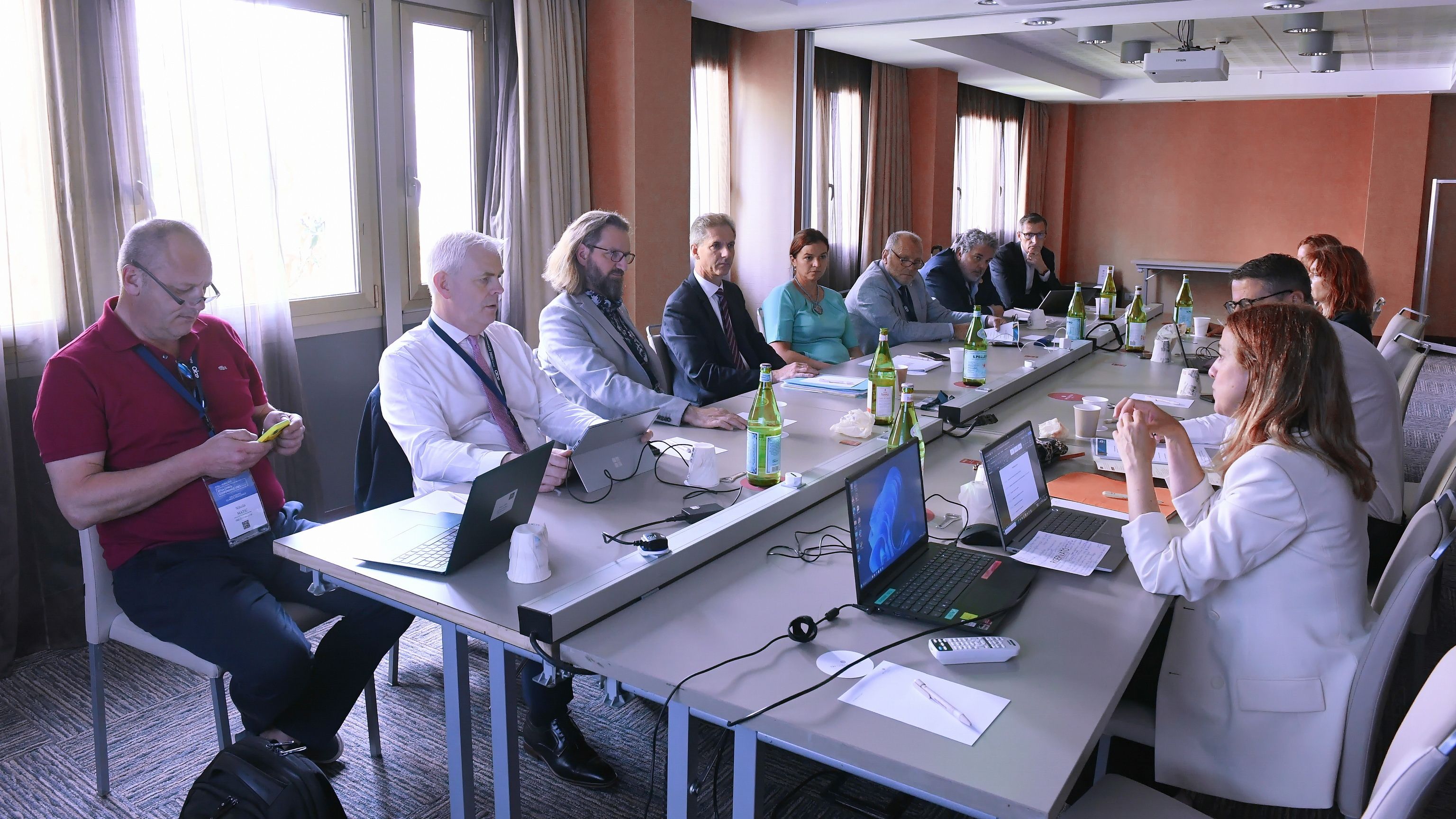
New appointments to the EFCA Board of Directors
We are thrilled to announce the appointment of esteemed professionals to our EFCA Board of Directors. Chaired by Inés Ferguson, the first female EFCA President, the board aims to promote excellence and collaboration in the engineering consultancy sector across Europe. With the newly appointed directors, EFCA is set to make a lasting impact on the industry. More information is here.
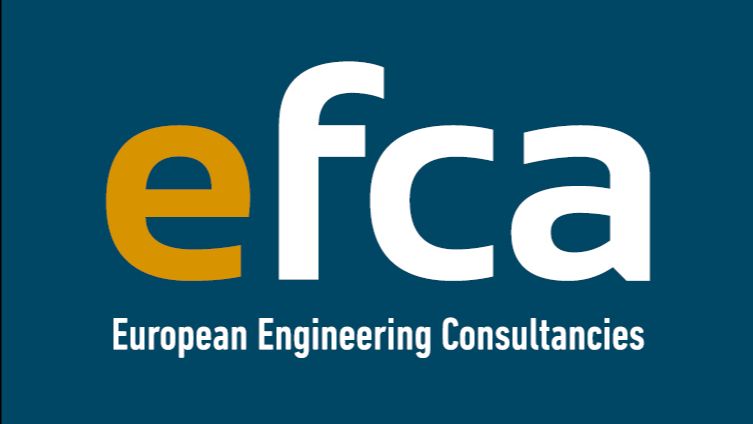
Revised Code of Ethics
EFCA’s Code of Ethics has been revised. The updated code reflects EFCA’s commitment to promoting the highest levels of ethical behavior and professional standards within the engineering consulting industry. Serving as a comprehensive guide, the revised Code of Ethics provides EFCA members with clear principles and guidelines, for upholding integrity and professionalism in their work. It reinforces EFCA’s values, at the heart of which are exceptional standards of conduct, for itself as an organisation as well as its members and the sector. More information is here.

EFCA’s commitment to EU Pact for Skills: Advancing engineering consultancy
EFCA is dedicated to promoting skills development within the engineering consultancy industry. With over 10,000 companies and one million staff members across 28 European countries, EFCA aims to make engineering the career of choice. As part of its commitment to the EU Pact for Skills, EFCA focuses on education, upskilling, and supporting female engineers. We also emphasise the importance of addressing the climate emergency and inspiring young people to contribute to sustainability. EFCA’s vision for 2030 includes increasing the number of young people in STEMD education and engineering, promoting dual skills as engineers/data engineers, and providing lifelong learning opportunities. Through specific initiatives like the Future Leaders’ Competition and workshops on topical themes, EFCA actively supports the development of skills in the engineering consultancy sector. More information is here.
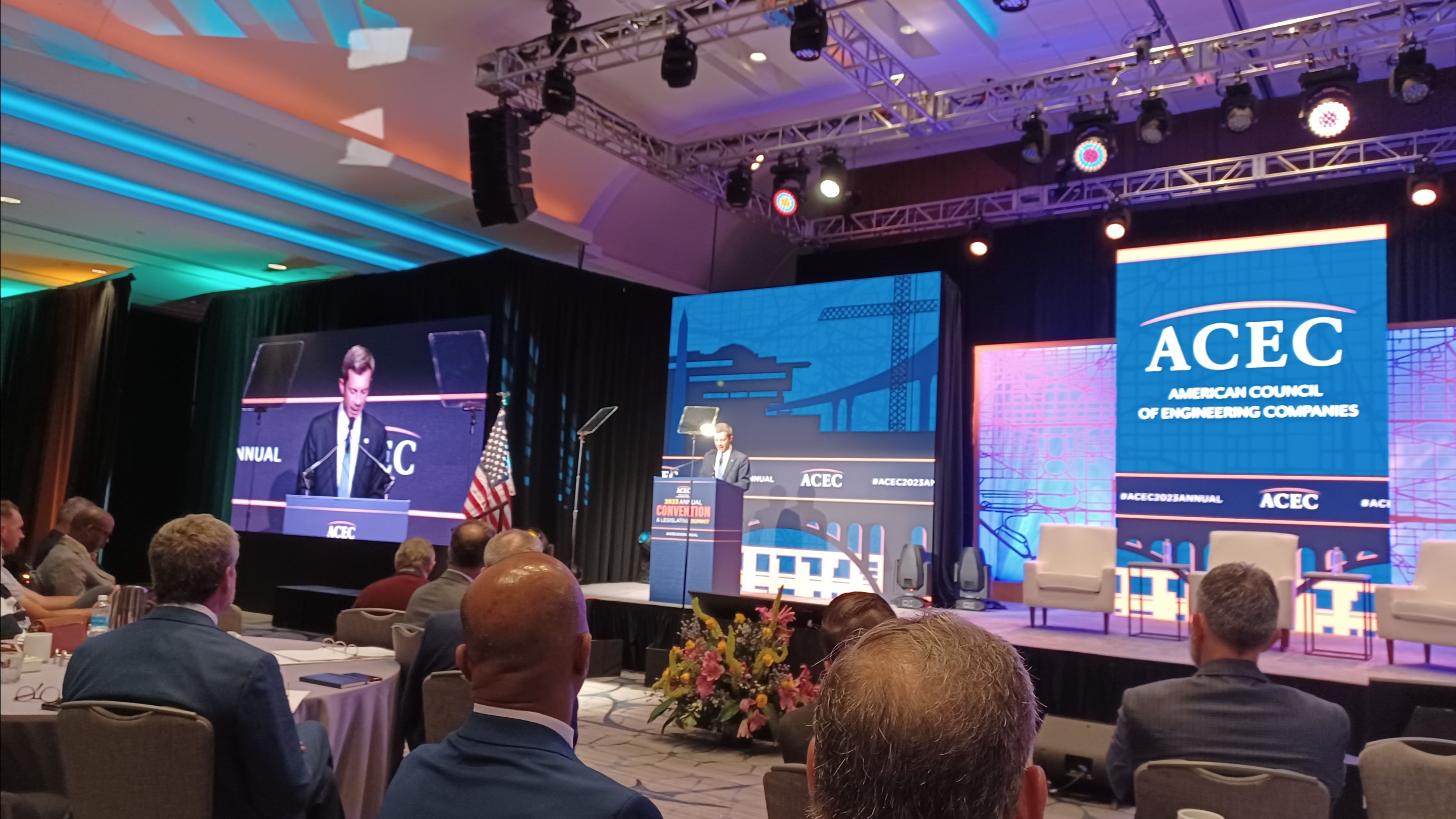
EFCA participates in ACEC’s Annual Convention
EFCA was invited to the American Council of Engineering Companies’ Annual Convention held in Washington, DC, from June 11th to 13th. The Convention gathered representatives from consulting engineering associations in different states, as well as business leaders. This year, the Convention focused on the economic situation in the United States and the massive opportunities that the Infrastructure, Investment, and Jobs Act (IIJA) is bringing to firms. It also covered a wide range of topics, including recruiting and the use of artificial intelligence in our business. The speakers included GOP Presidential Candidate Chris Christie and World Economic Forum CEO Børge Brende.
Inés Ferguson presented EFCA’s activities in ACEC’s International Committee, which is led by Dan Hilton. There was particular interest in the rebuilding of Ukraine, the EU Taxonomy and sustainability standards, and the future readiness of firms. She also met with ACEC President Linda Bauer to discuss the similar opportunities and challenges that both regions are facing. The Convention closed with a Gala Dinner and the Engineering Excellence Awards, where the Grand Conceptor Award was presented to the Sixth Street Viaduct Replacement project in the city of Los Angeles. More information is here.
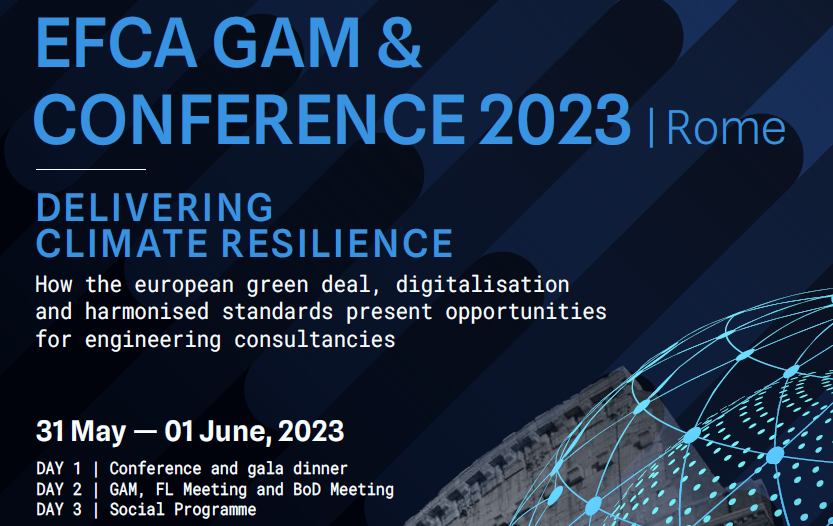
Promoting Resilience and Collaboration in Engineering
Rome was the setting yesterday for the EFCA International Conference 2023. Participants were treated to an opening line-up of the outgoing EFCA President, Benoît Clocheret, notable dignitaries such as Antonio Tajani, Vice-President of the Council of Ministers and Minister of Foreign Affairs and International Cooperation of the Italian Republic, Tullio Ferrante, Undersecretary of State for Infrastructures and Sustainable Mobility, and Elena Grech, Vice-Director of the European Commission Representation in Italy.
Three panels tackled the themes of Delivering Climate Resilience: How the European Green Deal, Digitalisation, and Harmonised Standards Present Opportunities for Engineering Consultancies. These panels featured distinguished speakers from diverse backgrounds, including representatives from the European Commission, the engineering community, academia, and other stakeholders. Their collective expertise and insight provided a comprehensive perspective on the subjects discussed, stimulating a well-rounded and enlightening dialogue.
We would like to express our sincere appreciation to all the panelists, moderators and the attentive audience for their valuable contributions. The conference’s inclusive atmosphere and the multitude of viewpoints shared have significantly enhanced our understanding of the challenges and opportunities in the field of engineering. More information is available here.

Deputy Minister for Communities, Territories and Infrastructure Development of Ukraine Azarkhina speaks at conference
The first panel in Rome addressed the topic Rebuild Ukraine -The role of European engineering and consultancy companies. It started with a message from Anna Jarosz-Friis, Acting Director of the European Commission’s Ukraine Unit in DG NEAR. Then came Oleksandra Azarkhina, Deputy Minister for Communities, Territories and Infrastructure Development of Ukraine, via live link from Kyiv. Both speakers highlighted the importance of collaboration in Ukraine’s reconstruction efforts and the vital contribution of engineers. From designing critical infrastructure to shaping urban planning and promoting sustainable energy systems, engineers play an indispensable role. This needs to be supported by a conducive legal framework. During the panel discussion, Nicolas Chomel, Chair of the EFCA Ukraine Support Group; Gabriel Blanc, Team Leader for Reconstruction (Directorate E1 – Ukraine Service) at DG NEAR; and Bakhtiyar Khodjaev, Vice-President of ICEG, delved into the policies, standards and EU-funded actions that will facilitate sustainable reconstruction in Ukraine. This timely session generated much discussion, with the supportive audience, which included delegates from Ukraine. The exchange of knowledge and experience established a strong foundation for constructive partnerships with the aim of rebuilding Ukraine’s infrastructure and ensuring its long-term resilience.

New President set to launch her term
Today saw the start of the first female President of EFCA. Inés Ferguson, Director of Business Development at TYPSA, officially assumed the presidency of EFCA, succeeding Benoît Clocheret, CEO at Artelia. Benoît effectively steered the organisation through the trials of the Covid pandemic, the conflict in Ukraine, the energy crisis and inflation. Expressing the importance of this moment, Inés emphasises the critical involvement of EFCA in shaping EU policies for green and digital transitions, as well as supporting the reconstruction of Ukraine: “Europe is leading an ambitious green and digital transformation and has a major role in rebuilding Ukraine, which is critical for our future. EFCA will make sure that consulting engineers are part of the solutions to these great challenges.” With her prior role as Chair of the EFCA Economic Environment Committee, Inés brings a wealth of experience, which will help her in her aim of deepening partnerships with influential organisations. Inés advocates for diversity and collaboration. More information is available here.

Future Leaders’ Awards: Celebrating Innovation and Excellence
During yesterday’s gala dinner, the winners of the fourteenth EFCA Future Leaders’ Awards were announced. This year’s winner is Anders Høie (Trimble Inc.) from Norway. He has played a crucial role in bridging the gap between the digital and physical realms. His project focused on integrating Augmented Reality (AR) into construction projects, enabling precise 3D model visualisation, customised displays, and access to object attributes for inspections. Patrick Kavanagh (Building Design Partnership, Ireland), the first runner-up, was the lead mechanical and electrical project designer of the Wren Urban Nest Hotel, which holds the distinction of being Ireland’s first net zero carbon hotel without relying on carbon offsets. Mads Holten Rasmussen (NIRAS, Denmark), the second runner-up, raised the bar for the standard of construction by implementing automated rule checking for designs in his project “BART.”
Congratulations to all the winners and runners-up for their outstanding contributions and dedication to advancing the field of engineering. We are proud to celebrate their achievements and look forward to their continued impact on the industry. More information is available here.
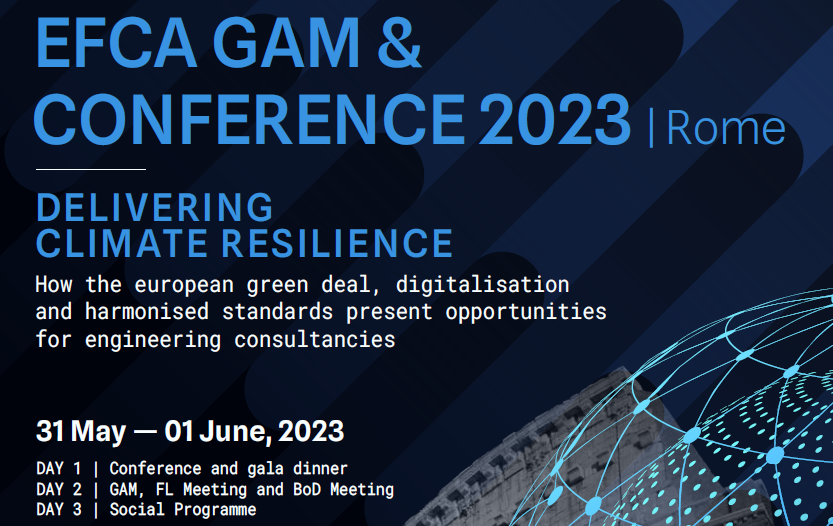
Join the Discussion on Climate Resilience at EFCA International Conference 2023 in Rome
The EFCA International Conference 2023 in Rome on May 31 is set to be an informative and thought-provoking event. With additional speakers confirmed for the discussion on “Delivering Climate Resilience: How the European Green Deal, Digitalisation, and Harmonised Standards Present Opportunities for Engineering Consultancies,” attendees can expect to gain insights into the crucial issues facing the industry. The conference will explore the ways in which engineering and consultancy companies can contribute to the reconstruction of Ukraine, the role of digitalisation in promoting structural resilience, and the opportunities available to consulting engineers in enhancing climate resilience. Whether you’re an industry professional or simply interested in the future of engineering and consultancy, this event is not to be missed. Register now to secure your place and be part of the discussion. More information is available here.

EFCA responds to Taxonomy Consultation
The EU Commission is currently seeking feedback on its proposed Taxonomy Delegated Acts. EFCA strongly supports the lowering of the target for recycled concrete use from 60% to 30%. EFCA believes that the 30% target is more realistic and achievable, but has also requested the reintroduction of CE.3.5.3, recognising that even achieving the lower target can be challenging when using recycled material that needs to be moved long distances. In line with CE. 3.5.4, the ultimate rationale should be that only options leading to the lowest CO2 emissions are used. More information is available here.
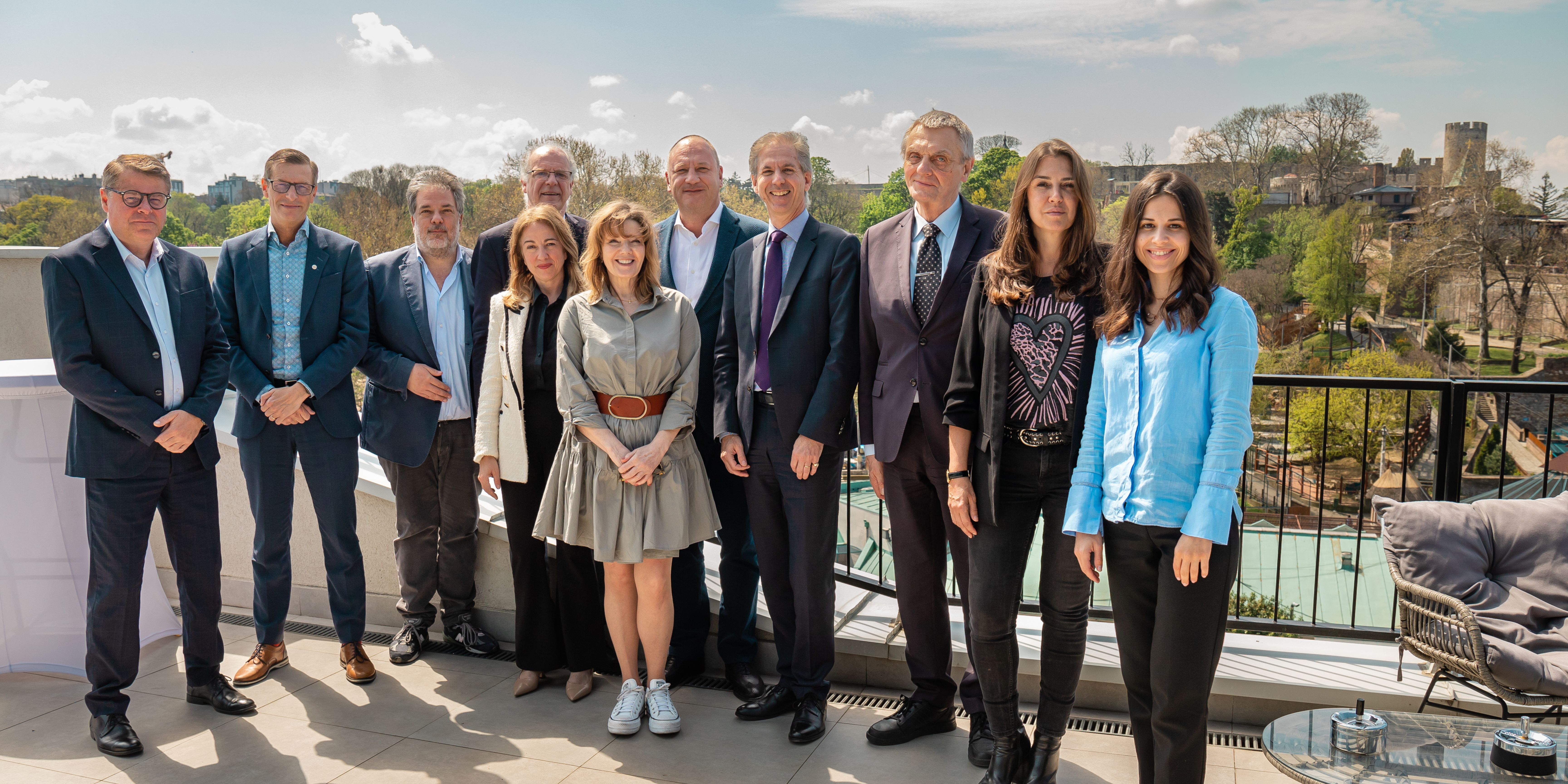
EFCA Board meets in Belgrade
Recently, EFCA’s Board of Directors met in Belgrade, hosted by the Association of Consulting Engineers of Serbia (ACES), to discuss critical topics related to the engineering industry. The evening before, a joint meeting with ACES, EFCA and the Construction Dispute Resolution Center heard updates from the Board members of the three organisations. Amongst other topics, participants considered skills development and addressing industry skill gaps. On the agenda for the EFCA Board were the implications of the Data Act, CSRD, and Taxonomy for EFCA members and the industry. The forthcoming General Assembly in Rome and a pre-assembly conference were also on the agenda. EFCA’s commitment to skills development, sustainability, and innovation continues to drive the industry towards a sustainable future.

Webinar: EFCA Highlights Critical Barrier to Full Digitalisation of Construction Industry
Last week, the High Level Construction Forum organised a webinar on the digital transition of the construction industry. During the webinar, the European Commission provided attendees with an update on its ongoing efforts to digitalise procurement processes and building permits, as well as find the right EU solution for digital building logbooks, which are already used at national level in some countries. From EFCA’s perspective the most important aspects, which currently threaten to hamper full digitalisation of the industry relate to data sharing and its implications for Intellectual Property, as well as security and privacy. This issue is also preventing the mindset change needed, because partners in the construction ecosystem are concerned about risk, as well as liability. EFCA believes that this one issue, above all others, must be resolved if we are to achieve the goal of full digitalisation in the long term.

EFCA’s European Green Deal Committee discusses taxonomy
Earlier this week, a new Chair hosted a meeting of sustainability experts from the consulting engineering community. Amongst other subjects, taxonomy and energy were on the agenda. The Chair and Vice-Chair, from COWI and Sweco respectively, consulted participants, who included the previous Chair and Vice-Chair. Immediate objectives for 2023 will build on past work and will align with the EU objectives of the Green Deal, where these match the expertise of the Member Associations and the consulting engineering firms. The sustainability expertise of the group, which includes circularity measurement, taxonomy and energy assure us of significant progress towards a sustainable future. Watch this space for updates on their work! Further information is available here.

EFCA will support work on cloud computing contract clauses
EFCA’s Chair of the Digitalisation and BIM Committee, Joseph Ickmans, has recently been accepted as a member of a newly formed sub-group to the Expert Group on B2B data sharing and cloud computing contracts. A civil engineer, currently responsible for major tunnel projects at Tractebel, Jef is also an expert in BIM. The list of members of this sub-group has not yet been published.
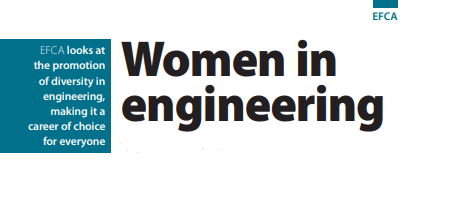
Women in engineering
In the latest edition of Construction Europe, EFCA emphasises the importance of promoting diversity and inclusion in the engineering and construction industry. The article pays tribute to women in engineering, acknowledging some leading women in the EFCA community and beyond. It highlights the chronic skills shortage in the industry, with women still being underrepresented; and provides statistics from different countries. Looking beyond the “traditional” profile of engineers will attract and retain talented individuals, boost innovation and creativity and motivate the next generation of engineers and construction professionals. Further information is available here.

Joint recommendations for future reconstruction of Ukraine
As a co-signatory of a joint paper, EFCA, along with other stakeholders from the Construction 2050 Alliance, emphasises the urgent need for reconstruction efforts in Ukraine once conditions make that possible. The estimated cost of reconstruction has risen to $138 billion and the World Bank estimates the total investment needed at around $350 billion. EFCA and the other co-signatories recommend rebuilding sustainably, involving and training local partners, using sustainable materials and following EU anti-corruption legislation. The paper also emphasises the importance of private sector investment in the long-term to accelerate and optimise the use of public money. Further information is available here.

Webinar: Commission initiatives supporting digital transition
EFCA will take part in the High Level Construction Forum webinar next week, on the digital transition of the construction industry. During the event on 25 April the European Commission will update participants on its ongoing efforts towards digitalising procurement processes and building permits; and improving digital building logbooks. Additionally, participants will be informed of the current status of the Data Act and the Artificial Intelligence Act. The webinar will also highlight the support available for SMEs, which face financial and other obstacles. Industry representatives will take part in a panel discussion and present their specific actions, aimed at supporting the Transition Pathway for the Construction Ecosystem, which was published on 15 March 2023. EFCA will outline its own commitment and some of the relevant actions being undertaken by the consulting engineering industry. Further information is available here.

EFCA proposes measures to manage contracting process
Following recent discussions aimed at trying to resolve some of the obstacles to the reconstruction of Ukraine, EFCA has proposed solutions, to the Directorate-General for Neighbourhood and Enlargement Negotiations (DG NEAR). European engineering consultancies will be at the forefront of the reconstruction efforts. These require a suitable legal and political framework, to ensure a transparent and efficient procurement process. EFCA recommends a project-based approach for infrastructure reconstruction, adherence to European standards and FIDIC contract models; and the simplification of procedures for European companies to work with local firms. EFCA also proposes the creation of a dedicated EU Framework Contract for the reconstruction of Ukraine, which would accelerate the procurement process and ensure that the best-qualified resources are procured.
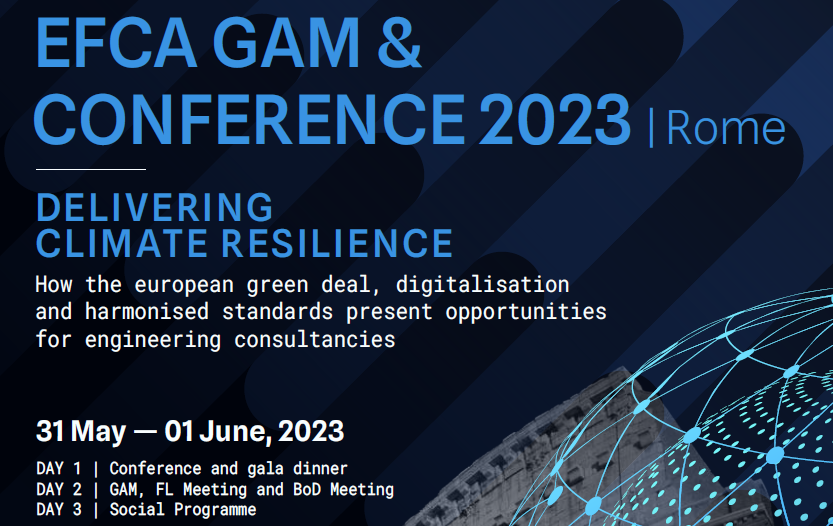
Together with our Italian member OICE, we are excited to announce that registration is open for the EFCA General Assembly & Conference 2023. Members will join us in Rome for both events and non-members can join us on 31 May 2023 to explore how the engineering industry can contribute to improved climate resilience and take advantage of the opportunities presented by digitalisation, harmonisation and the European Green Deal. The conference will feature expert speakers, networking opportunities and a lunch for C-suite executives from consulting engineering firms across Europe. The Gala dinner will include the EFCA Future Leader Award Ceremony. Register now to secure your spot and learn more about the future of the industry. More information is available here.
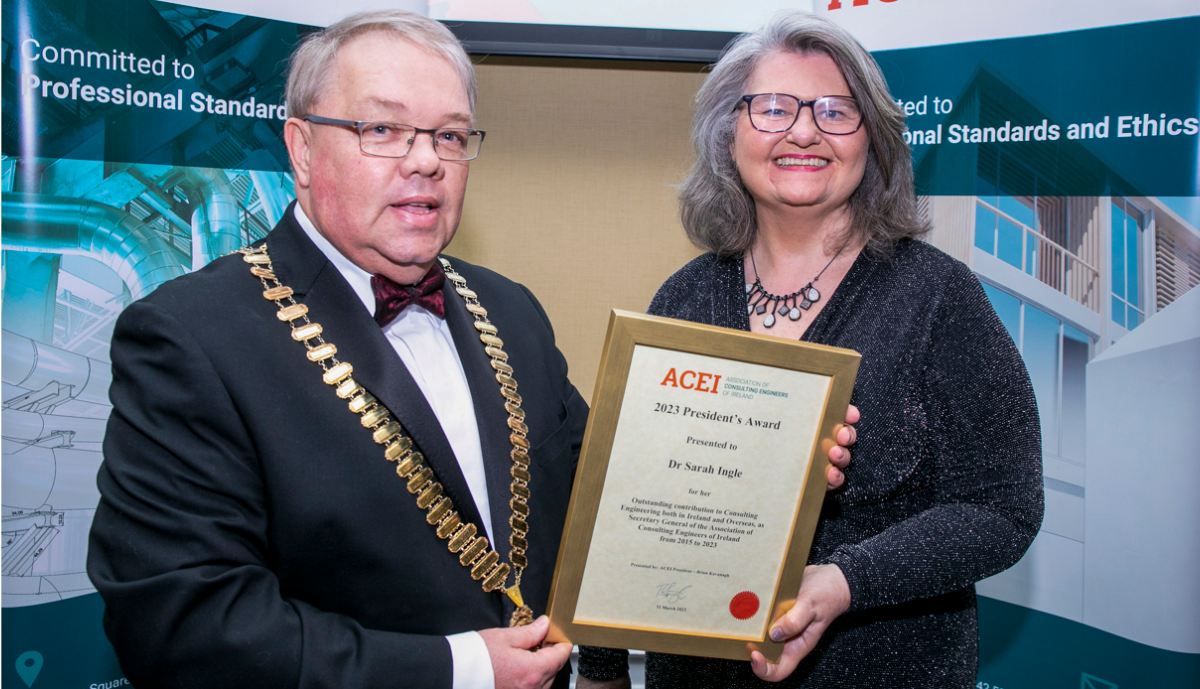
Brian Kavanagh, ACEI President 2022-2023 presenting
the President’s Award to Dr Sarah Ingle, ACEI Secretary General
Annual Engineering Excellence Awards Ceremony in Dublin
The Association of Consulting Engineers of Ireland (ACEI) organised a gala dinner last week in Dublin. During the event, Brian Kavanagh, ACEI President 2022-2023, celebrated with the winners of the annual Engineering Excellence Awards. The awards are an excellent opportunity for firms to showcase their remarkable work and be acknowledged for their efforts. RPS was awarded the Project of the Year title for its Carbon Capture and Storage (CCS) Study to Process & Store CO2. In addition, the guests paid tribute to Dr Sarah Ingle, who is leaving her post as Secretary General of the association after over 8 years, to move to the US. She received the 2023 President’s Award for her exceptional contribution to the association and the engineering field. Sarah has also served as an active member of the EFCA Board. EFCA congratulates all the winning firms for their impressive accomplishments and wishes Dr Ingle all the best for her future endeavours. More information is available here.
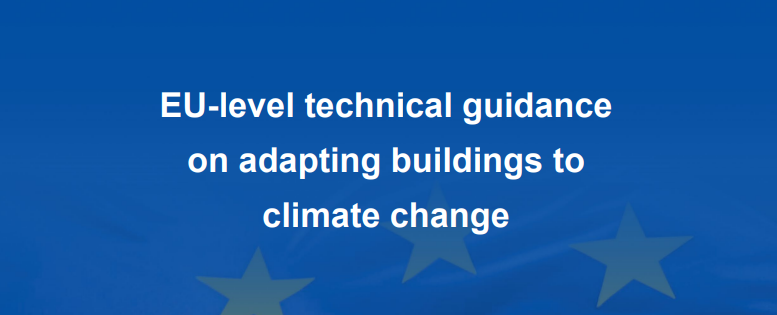
EU Technical Guidance on Adapting Buildings to Climate Change
Just published, this report gives details of existing methods, best practice and guidance for climate-resilient buildings. With practical advice for professionals, it also serves as a reference for EU policy documents. The report covers policies and standards related to building adaptation, structural design standards, climate vulnerability and risk assessment; and approaches for rating building resilience. The guidance is intended to encourage the adoption of climate-resilient building standards across Europe. More information is available here.

Study on Digital Building Logbooks for construction industry
The European Commission (DG GROW) has launched a study to support the development of Digital Building Logbooks (DBLs) that will help the digitalisation of the construction ecosystem. The survey aims to gather feedback and input on the potential costs and benefits of implementing DBLs and related activities. The result should be a framework with protocols for DBLs combined with guidelines to implement DBLs at the national level, facilitating harmonisation and sharing of building data. DBLs will connect stakeholders throughout the lifecycle of a building by facilitating the collection, storage, exchange, sharing and updating of data. More information is available here.
The Spring edition of the IAE newsletter has been published and includes:
INTEGRATED LAND USE & TRANSPORTATION STRATEGY FOR DUBLIN Published January 2023
This is part of the output from the IC 70 group. The IC 70 Working Group was established by the Royal Institute of the Architects of Ireland (RIAI) and the Irish Academy of Engineering to recommend how Irish cities should best be developed in the period to 2070. Gerry Duggan FIAE has ably represented the Academy on the group. In that context it has undertaken a major review and published a report and recommendations in 2022 of how Galway city could be developed over this future period. The present study is a part of the group’s continuing work programme.
CAETS Energy report – Towards Low-GHG emissions from Energy use in selected sectors
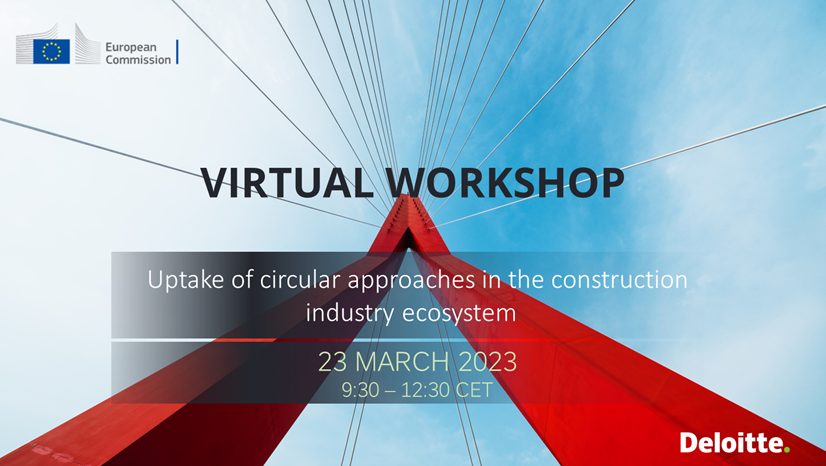
EFCA in workshop on Circular Approaches in the Construction Ecosystem
A workshop was held to support a study for the European Commission, on the application of circular approaches in the construction industry and the relevant measures that are required. Amongst other things, stakeholders considered a shortlist of indicators that could eventually be adopted. Sustainable Design Expert Wouter Schik from Arcadis, gave examples of circularity approaches used recently in the Netherlands and recommended thinking wider than just product or building level. Further information is available here.
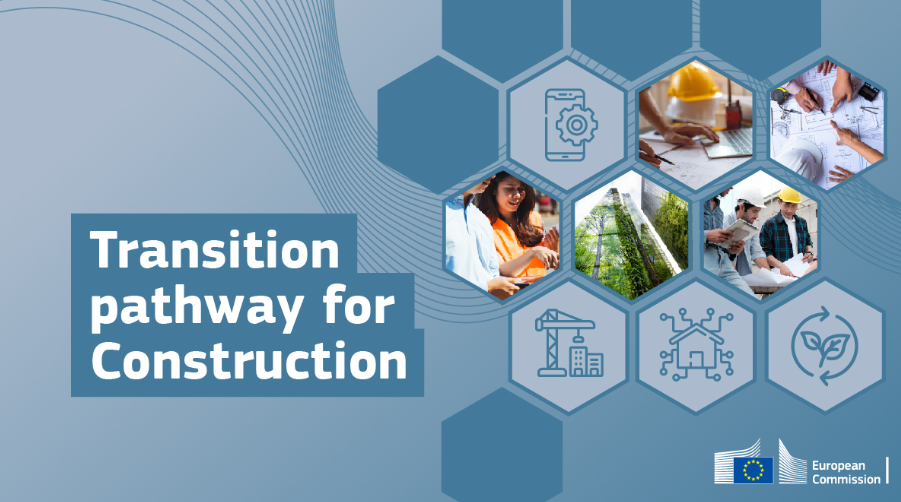
Publication of Transition Pathway for Construction
The European Commission’s Directorate-General for Internal Market, Industry, Entrepreneurship and SMEs (DG GROW) has published the eagerly anticipated Transition Pathway for Construction. The EU Updated Industrial Strategy, from which this document originates, calls for a quick transition towards green and digital industrial ecosystems, with each sector required to develop specific and achieveable plans for transition. Construction is the second largest industrial ecosystem in the EU and employs over 25 million people. A key industry in the delivery of the EU Green Deal and the Digital Decade it faces various challenges from the aftermath of Covid-19, digital transformation and climate crisis. EFCA welcomes the document and will comment in more detail in due course. Further information is available here.

EFCA Future Leaders’ Competition 2023 – Jury announced
EFCA Future Leaders’ Competition 2023 is open to all professionals aged 35 and under working for member firms of EFCA national member associations. The competition aims to showcase the talent of Europe’s next generation of leaders in the consulting engineering sector. This year, the jury will be chaired by former EFCA president Kevin Rudden (CEO of Garland), who will be joined by Marcin Mikulewicz (President of Management Board of Globtank) and last year’s winner, Federico Foria (Geotechnics, Geology and Hydraulics Department Manager at ETS). With their expertise and experience, the jury members will assess the submitted projects based on various criteria, including technical achievements, leadership and social and community contributions. We are excited to see the incredible projects and achievements of the participants and look forward to recognising and celebrating the exceptional young talent within the consulting engineering sector. Further information is available here.

EP adopts revised EPBD
The European Parliament has voted on a proposed revision of the Energy Performance of Buildings Directive, which aims to substantially reduce greenhouse gas emissions and energy consumption in the EU building sector. The vote effectively approved the target for all new buildings to be zero-emission by 2028, with the deadline for new buildings occupied, operated or owned by public authorities in 2026. Member States will establish national renovation plans and support measures against energy poverty. Certain buildings will be excluded from the new rules, but MEPs have allowed Member States to adjust the new targets in a limited share of buildings depending on economic and technical feasibility and availability of skilled workforce. Further information is available here.
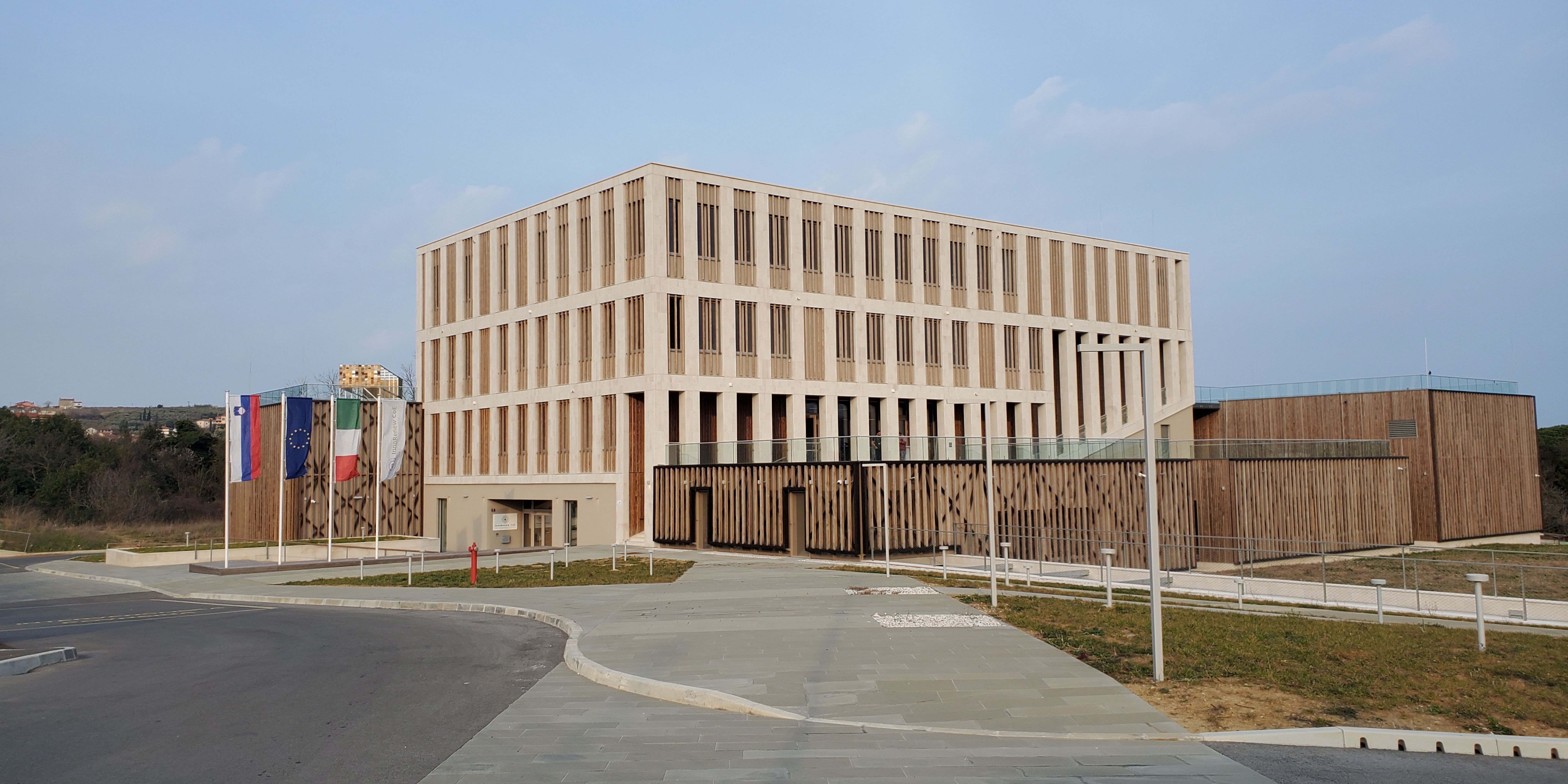
EFCA participates in NEBAcademy Design Workshop
EFCA participated in the New European Bauhaus Academy’s design workshop in Izola, Slovenia. The NEBAcademy aims to promote new skills required to make the construction sector sustainable, digital, and inclusive. A lack of skills and knowledge is hampering the green transition and the Academy hopes to resolve this by offering off- and online training modules for circularity and the use of bio-based materials for the construction ecosystem, amongst other things. Academy Hubs across the EU will offer in-person training. The first one has been established at the University of Primorska in Slovenia. Further information is available here.

Consulting industry calls for hardship and price revision clauses in EU service contracts
As the pandemic and other unforeseeable events continue to disrupt the world, the consulting industry, represented by EFCA, for the European Engineering Consultancies and the European Federation of Management Consultancies Associations (FEACO) have written to DG INTPA, European Commission, calling for the introduction of hardship and price revision clauses in INTPA service contracts. A hardship clause would allow both parties to renegotiate the terms of the contract when an unforeseeable event fundamentally alters the financial terms, in reality. Further information is available here.
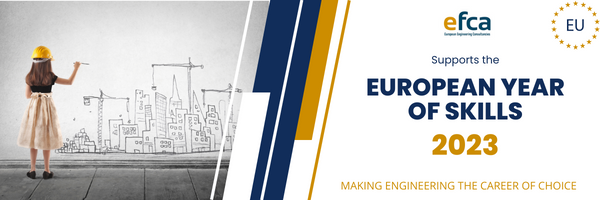
EFCA promotes diversity in engineering on International Women’s Day
As the world celebrated the International Day of Women, EFCA wants to highlight the importance of promoting diversity in engineering. The world is facing some massive challenges, including the climate emergency. Engineers are the invisible rock stars in the construction value chain. Their skills and expertise are crucial to solving current and future global challenges, but the consulting engineering sector is experiencing a talent shortage. More women in engineering can help to address this shortage. One of EFCA’s relevant actions is participation in the EU Pact for skills. The federation is working with its members to promote young talent in the sector. Further information is available here.
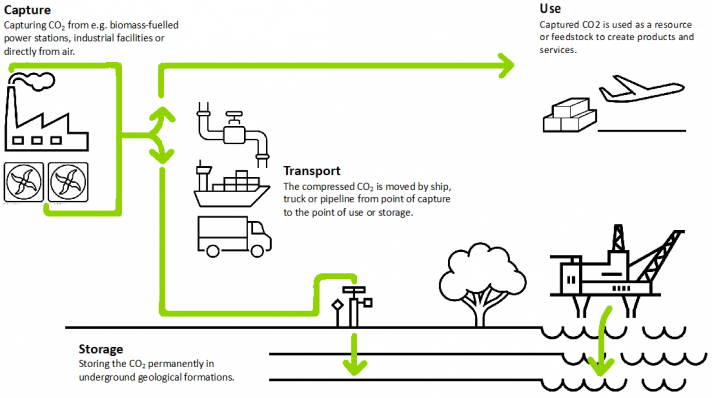
CCUS Forum launches website to drive climate action in the EU
Carbon capture, storage and utilisation are indispensable for reaching the European Union’s climate targets, in particular when it comes to decarbonising industries with emissions which are hard-to-abate. To support the European Commission in the development of CCUS policies and facilitate a stakeholder dialogue, the CCUS Forum was established. The Forum’s work started in 2021. The European Commission has now set up a landing page where interested parties can access all the meeting documents and post papers. Further information is available here.

EFCA joins EU Pact for Skills
One of EFCA’s first actions in 2023 was to apply to join the EU Pact for Skills. The Pact aims to improve competitiveness in European industry and increase the employability and skills of European citizens. The Pact is a partnership between the European Commission, Member States, social partners and other key players. It seeks to bridge the gap between available skills and those required by the labour market. EFCA is committed to promoting skills development and lifelong learning in the consultancy engineering field.
Engineering is an extremely skilled and rewarding profession. Nevertheless, EFCA and its members recognise that the sector needs to remain attractive to future professionals. The federation is looking forward to working with other members of the pact to help shape the future of skills in Europe.

The Committee on Industry, Research and Energy (ITRE) of the European Parliament has recently adopted MEP Ciarán Cuffe’s report on the Energy Performance of Buildings. EFCA broadly welcomes the updated EPBD, which will improve the energy efficiency of buildings and contribute towards the decarbonisation of the EU’s building stock. The text adopted by the ITRE Committee includes setting minimum energy performance standards (MEPS) for buildings and making renovation mandatory for the worst-performing buildings in Europe. In addition, the use of renewable energy sources is promoted. During the 13-16 March plenary session, members of the European Parliament will vote on the draft legislation.
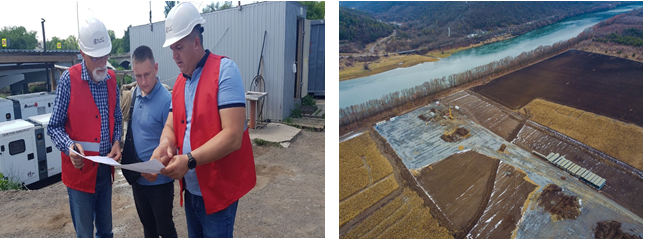
B-Act is a Polish engineering consulting firm with expertise in managing and supervising construction projects in Poland, Romania, Ukraine, and the Baltic States. Despite the situation in Ukraine, B-Act has continued to work there. The company is working with local engineers, supporting infrastructure projects and reconstruction. B-Act is using cutting-edge technologies to help the company to deliver projects for the recovery of damaged infrastructure in Ukraine. Further information is available here.

Members of the Platform on Sustainable Finance announced
These new members will work on taxonomy criteria, following the work that was done by the previous members. The Platform’s mandate has its origins in the Taxonomy Regulation (EU) 2019/2088. Further information is available here.
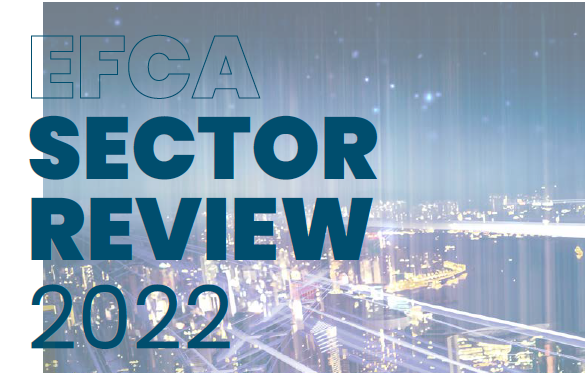
Launch of EFCA Sector Review 2022
The EFCA Sector Review 2022 has just been published. This report demonstrates, amongst other things, how engineering services for construction are evolving, with strategic investments, including acquisitions, that will drive change towards a more climate resilient built environment. The top companies and groups operating in Europe are identified, based on their turnover in the region for engineering services for construction and the built environment. A snapshot of recent developments shows that Covid continued to impact supply chains and workers’ mobility in 2022. More positively, trends, including digitalisation, urbanisation and sustainability are stimulating growth in the sector. Read the full report here.
Assessing the future-readiness of consulting engineers
How future-ready are consulting engineers? How prepared for disruption, from digitalisation, sustainability and evolving regulation?
To find out. EFCA Future Trends Committee is conducting a survey, in partnership with the HHL Center for Strategy and Scenario Planning. The survey will assess the ability of consulting engineers to deal with disruption as well as reasons for any potential lack of future-readiness. The results will form the basis of a “playbook”- a tool to successfully navigate the future challenges facing our industry.
All respondents will receive the survey’s results as well as the playbook.
This initiative is the last in a three-phase series. The first was in 2021: Which way to go? Strategic scenarios for consulting engineers in times of high uncertainty. Last year saw the second, Seizing opportunities in times of disruption. How the consulting engineering industry can overcome the challenges of digitisation, harmonisation, and sustainability – a disruptive scenario analysis.
Participate in the survey here.
Digitalisation and sustainability: the view of young engineers
We need to succeed with the twin green and digital transitions to secure a sustainable future for present and future generations. This demands, among other things, skilled people and the use of digital technologies. The latter requires change and adaptation of work processes, re- and upskilling, as well as the ability to seize opportunities that come with new technology and cultural change. To understand where young engineers stand on digitalisation and sustainability across Europe, EFCA Future Leaders have launched a short survey, aimed at employees under the age of 40, of engineering consultancy companies. By understanding how young consulting engineers view the current state of digitalisation and sustainability across Europe, EFCA Future Leaders also aim to:
Provide knowledge on national performance to identify areas for further improvement
Initiate Europe-wide knowledge-sharing and learning from best practice
Provide transnational intelligence to the EFCA community, to support its concrete policy action
The results will be analysed and presented to the EFCA community at the next EFCA General Assembly Meeting in June. The findings will also be shared on the Future Leaders LinkedIn channel.
Participate in the survey here.
Single Market at 30
As the Single Market turns 30, the European Commission will host a number of events throughout the year, marking the anniversary of the creation of what has become the world’s largest common trading area. Operating on the basis of four fundamental freedoms: people, goods, services and capital, the Single Market has made it easier for the 27 Member States to trade on a level playing field and for citizens to live and work anywhere within EU borders. For the consulting engineering community, public procurement remains one of the most important aspects and EFCA’s Internal Market Committee continues to advocate for contracts that are awarded on the basis of the Most Economically Advantageous Tender. EFCA would like to see further improvements in the way contracts are awarded in the EU, including a greater focus on sustainability and digitalisation, enabling a more rapid completion of the twin green and digital transitions.
Further information is available here.
